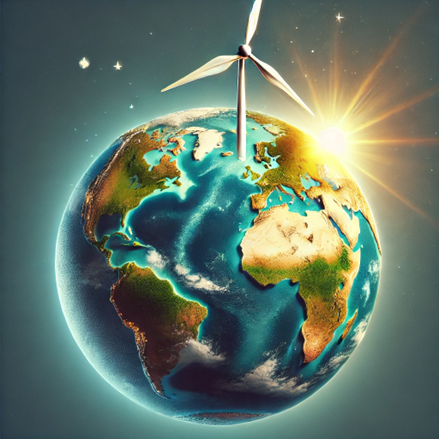Hydrogen import strategy - The potential countries of origin of hydrogen imports
Sun and wind are essential location factors for the sustainable production of hydrogen
This article is the second part of a four-part series of articles to mark the publication of the former German government's hydrogen import strategy in July 2024 and deals with the expected countries of origin of hydrogen imports. It follows on from the first article in the series on the hydrogen import strategy - Market ramp-up and import requirements
Hydrogen from the EU / EFTA member states
According to the European hydrogen strategy and the EU Commission's REPowerEU plan, 10 million tonnes of hydrogen are to be produced within the EU by 2030. Regions with high wind and solar potential offer particularly favourable production conditions. Such favourable conditions can be found in particular in the
- North Sea,
- Baltic Sea,
- Mediterranean region and
- Black Sea region.
According to the hydrogen import strategy, a dialogue with the relevant EU and EFTA member states shall take place regarding regulatory and market-related issues of the hydrogen market ramp-up. This shall facilitate intra-European supply relationships and create a solidarity-based hydrogen market.
Co-operation with potential export nations outside the EU / EFTA
The Federal Republic of Germany is also working bilaterally with potential partner countries outside the EU and EFTA to develop hydrogen production and export capacities in those countries. This mainly takes place within the framework of climate and energy partnerships (CEP) and hydrogen partnerships.
Bilateral Hydrogen cooperation agreements: Germany has already concluded such agreements with Algeria, Australia, Chile, Egypt, India, New Zealand, Oman, Saudi Arabia, South Africa, Turkey, the United Arab Emirates and the United Kingdom. These countries have better hydrogen production conditions than Germany. For example:
- Australia has around twice as much solar radiation, very good wind conditions and large areas of land. The cooperation was established in 2021 through a joint declaration of intent ("German-Australian Hydrogen Accord"). The three central initiatives of the memorandum of understanding are HyGATE (German-Australian Hydrogen Innovation and Technology Incubator), support for German-Australian demonstration projects and facilitating the sale of hydrogen and its derivatives from Australia to Germany through the H2Global initiative. A feasibility study funded by the Federal Ministry of Research, Technology and Space has been underway since 2020 to specify the exact form of further hydrogen cooperation between Germany and Australia. One particular challenge lies in transporting the hydrogen produced in Australia to Germany.
- The United Kingdom has experience and untapped potential around offshore wind farms. The United Kingdom also plans to export green hydrogen. The collaboration will cover the following areas:
- accelerating the realisation of hydrogen projects;
- building international leadership to support the development of regional and global hydrogen markets;
- promoting research and innovation projects;
- promoting trade opportunities for hydrogen and hydrogen-related goods, technologies and services;
- exploring financial support mechanisms.
The collaboration will be based on cooperation and knowledge exchange and not on the transfer of financial resources. A supplementary cooperation between operators of hydrogen transmission networks is currently in the early planning stages.
- Chile has sufficient open spaces and a high level of solar radiation, which means there is great potential for solar energy. An energy partnership has been in place between Germany and Chile since 2019, which has resulted in various conferences and task forces. Potential challenges include building up the necessary expertise among local specialists and establishing environmentally sustainable water management as well as the transport of green hydrogen to Germany.
Hydrogen research partnerships exist, for example, with Canada, Japan, New Zealand and the Netherlands. They bring industry, science and politics together at an early stage and thus establish subsequent import relationships. Germany also wants to establish itself as an exporter of hydrogen technologies. In addition, personnel can be trained to establish a local hydrogen economy.
There are other forms of cooperation with numerous other countries, particularly in South America and Africa, which also include cooperation in the field of hydrogen.
In any case, the hydrogen research partnerships are supposed to be integrated into the CEPs and the hydrogen partnerships in the future.
- Climate and development partnerships (e.g. with Brazil, Columbia, India, the Ivory Coast, Kenya, Morocco, Serbia) strengthen local players in the field of green hydrogen. This is intended to contribute to the decarbonisation of local economies.
- Just Energy Transition Partnerships (JETP, consisting of South Africa, Indonesia, Vietnam and Senegal) support a socially just energy transition in the partner countries. To this end, local knowledge and local hydrogen capacities are to be expanded through education and training programmes as well as local and international networking.
- The International Climate Initiative (IKI) supports various hydrogen projects in developing and newly industrialised countries in order to support the development of climate-neutral value chains. This also includes the development of local knowledge and local capacities. In the field of hydrogen, for example, the IKI supports the UNIDO Partnership for Net Zero Industry and the H2-diplo programme, which aims to set up hydrogen diplomacy offices at various locations in export and transit countries. Such hydrogen diplomacy offices have already been opened in Angola, Colombia, Kazakhstan, Kenya, Nigeria, Oman, Saudi Arabia and Ukraine.
Conclusion
The Federal Republic of Germany uses numerous instruments to achieve a ramp-up of the hydrogen market at a European and international level. Outside the EU / EFTA states, the cooperation also has a development policy component. The cooperation projects aim to support local decarbonisation and knowledge development in (potential) hydrogen exporting countries at the same time. The objective is to export the hydrogen technologies and the associated knowledge developed in Germany in order to import hydrogen from suitable production countries in return.
In our next article, we will look at the challenges of transporting hydrogen from the potential importing countries and the design of the hydrogen core network via which the hydrogen is to be transported within Germany.
Chatham Partners' specialises in complex issues and procedures in connection with hydrogen projects and is happy to advise you on their planning and implementation, in particular in connection with procurement and planning procedures as well as funding opportunities.
We would like to thank Flora Bantelmann, Louica Unger and Christoph Ludwig for their valuable support in preparing this article.

DALL-E generated picture


